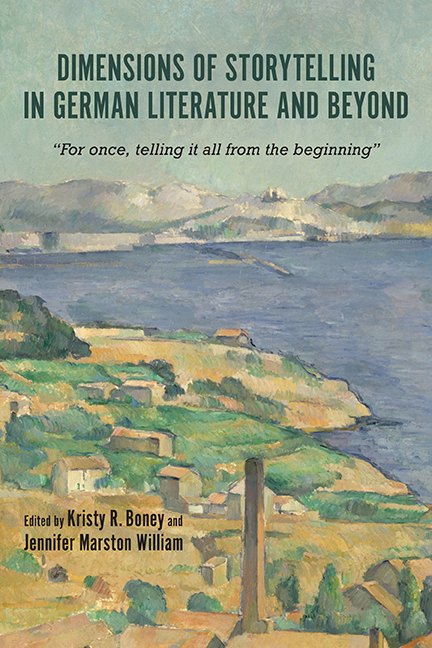 Dimensions of Storytelling in German Literature and Beyond
Dimensions of Storytelling in German Literature and Beyond Book contents
- Frontmatter
- Contents
- Acknowledgments
- Introduction: The Social, Political, and Personal Dimensions of Storytelling
- Part I Anna Seghers: A Missing Piece in the Canon of Modernist Storytellers
- 1 Anna Seghers in Heidelberg: The Formative Years
- 2 Who Is the Narrator? Anna Seghers's “The Excursion of the Dead Girls”: Narrative Mode and Cinematic Depiction
- 3 Anna Seghers's Rubble Literature, 1947–49
- 4 Anna Seghers and the Struggle to Tell Stories about the Nazi Past in the Early German Democratic Republic
- 5 Aufbauzeit or flaue Zeit? Anna Seghers's GDR Novels
- 6 The Time of Decision in Anna Seghers
- 7 Filling the Void with Stories: Anna Seghers's Conceptual Metaphors
- Part II Expressions of Modernity: Using Storytelling Unconventionally
- Part III The Personal Narrative: Storytelling in Acute Historical Moments
- Notes on the Contributors
- Index
6 - The Time of Decision in Anna Seghers
from Part I - Anna Seghers: A Missing Piece in the Canon of Modernist Storytellers
Published online by Cambridge University Press: 12 April 2019
- Frontmatter
- Contents
- Acknowledgments
- Introduction: The Social, Political, and Personal Dimensions of Storytelling
- Part I Anna Seghers: A Missing Piece in the Canon of Modernist Storytellers
- 1 Anna Seghers in Heidelberg: The Formative Years
- 2 Who Is the Narrator? Anna Seghers's “The Excursion of the Dead Girls”: Narrative Mode and Cinematic Depiction
- 3 Anna Seghers's Rubble Literature, 1947–49
- 4 Anna Seghers and the Struggle to Tell Stories about the Nazi Past in the Early German Democratic Republic
- 5 Aufbauzeit or flaue Zeit? Anna Seghers's GDR Novels
- 6 The Time of Decision in Anna Seghers
- 7 Filling the Void with Stories: Anna Seghers's Conceptual Metaphors
- Part II Expressions of Modernity: Using Storytelling Unconventionally
- Part III The Personal Narrative: Storytelling in Acute Historical Moments
- Notes on the Contributors
- Index
Summary
ANNA SEGHERS's 1959 novel of socialist construction Die Entscheidung (The Decision) marks a turning point in the reputation of an author whose literary career, had the Cold War taken a different course, would surely have been one of the most celebrated in modern German letters. Although this essay will not directly justify my assessment, I am far from alone in considering Seghers one of the great writers of the past century in terms of the imaginative range of her material, the discipline of her formal and affective registers, and the power of her social vision. The effect The Decision had on her reputation is only partly related to the strengths and weaknesses of the novel, which remains an affecting work even as its narrative particularities differ from those that lent her pre-Cold War work its well-deserved fame. It is not a novel of elemental revolt against the degradation of life, as her early works were, but in a more indirect way it depicts a revolt against the vulgar temporality of the judgments of her time—it is, in this sense, a novel about acting on principle. Here, then, elementary values of dignity, care, and bodily communion do not rise up against the weight of indifference and persecution. Those values, although invoked, are held in check by a proposition about the direction of the present that is much harder to portray as experiential grounds for revolt. Panning the novel for what they took as its naïve adherence to the official doctrine of the Socialist Bloc, West German critics vigorously provincialized Seghers's cosmopolitan reputation. Even as her imagination in this period took her stories to settings spanning centuries in countries in Africa, China, and the Caribbean, her work was tied to the ideological discourse of an unprincipled present. It was not viewed as pursuing aesthetic strategies capable of transforming readers’ taste in lasting ways; rather, the work was characterized as trying to influence readers to make a decision for East Bloc socialism that flew in the face of casual common sense—as, arguably, her characters’ decisions seem to do Socialism in these critics’ eyes was so tainted by dictatorship that such a perverse aim could only indicate the bad faith of an ideologue, not the sensuous convictions of an artist.
- Type
- Chapter
- Information
- Dimensions of Storytelling in German Literature and Beyond“For once, telling it all from the beginning”, pp. 82 - 94Publisher: Boydell & BrewerPrint publication year: 2018
